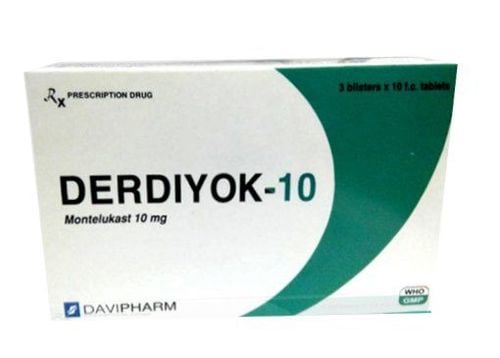This is an automatically translated article.
Asthma is a chronic inflammatory airway disease characterized by inflammatory cells. Treatment of asthma depends on the severity of the disease. There are many medications used in the treatment of asthma, and Cinqair IV Reslizumab is one of them. So what is Cinqair, how to use it?
1. What is Cinqair?
Cinqair belongs to the group of injectable Interleukin inhibitors, containing the main active ingredient is Reslizumab - an interleukin-5 (IL-5) antagonist monoclonal antibody. IL-5 is a proinflammatory cytokine responsible for the development and differentiation, mobilization, activation, and survival of eosinophils (aka eosinophils).
Elevated eosinophil levels increase the risk of asthma exacerbations, including both allergic and non-allergic asthma.
By targeting IL-5 and disrupting signaling pathways in this inflammatory response Reslizumab inhibits eosinophil maturation and promotes apoptosis, thereby contribute to the symptoms of asthma.
This medicine is prescribed in combination with other medicines to control severe asthma associated with eosinophilia (Eosinophilic asthma)
2. Notes when using Cinqair
To use Cinqair properly and for the best effect, follow all instructions from your doctor. This medicine is not intended for use by people under 18 years of age. Cinqair should not be treated if you are allergic to Reslizumab. To make sure Cinqair is safe for you, tell your doctor if you are also using a steroid asthma medicine; ever been infected with parasites (such as roundworms, tapeworms). Using Cinqair may increase your risk of developing cancer. Ask your doctor about this risk. It is not known if Cinqair will harm an unborn baby so tell your doctor if you are pregnant. However, uncontrolled asthma during pregnancy can lead to premature delivery, low birth weight, or other pregnancy complications such as eclampsia (a dangerous condition in which high blood pressure during pregnancy can lead to low blood pressure). may lead to medical problems for both mother and child). Your doctor will weigh the benefits and risks before deciding to use this medicine for you. Cinqair may not be safe in lactating women and should be used with caution.
3. How is Cinqair used?
Cinqair is a prescription medication, given as an intravenous infusion, usually once every 4 weeks. You need to go to a medical facility to get this injection. Absolutely do not arbitrarily use at home. This medicine must be given slowly and may take 20 to 50 minutes to complete. Close monitoring is required for a short time after each injection, to ensure that there are not any allergic reactions. If you are also taking steroids, you should not stop taking them suddenly. Your doctor will give instructions about reducing your dose. Before you start treatment with Cinqair, certain tests may be needed to measure white blood cell counts. Cinqair is not an asthma medication. If breathing problems get worse quickly or if you think your asthma medication is not working, seek medical help. Take all your asthma medications as directed. Dosage needs may change due to surgery, illness, stress, or recent asthma attack. Do not change the dosage or dosing schedule without your doctor's consent. Let your doctor know if any of the medicines seem to stop working. The usual adult dose of Cinqair for asthma is 3 mg/kg IV over 20 to 50 minutes every 4 weeks. The drug should not be administered intravenously. The infusion should be discontinued immediately if the patient develops severe systemic reactions, including anaphylaxis. If you miss a dose of Cinqair injection, call your doctor for instructions. Since this medication is prescribed and administered in a medical setting, an overdose is unlikely.
4. Side effects and drug interactions
Possible side effects when using Cinqair include:
Allergic reactions to Cinqair : Urticaria; shortness of breath; swelling of the face, throat, lips, tongue. Dizzy. Nausea. Dizzy. Itchy. Shortness of breath. Sore throat. Muscle pain. Cinqair may interact with some of the following drugs:
Abciximab : The risk or severity of adverse events may be increased when Abciximab is combined with Reslizumab. Adalimumab: The risk or severity of side effects may be increased when Adalimumab is combined with Reslizumab. Aducanumab: The risk or severity of adverse events may be increased when Reslizumab is combined with Aducanumab. Human Anthrax Immunoglobulin: The risk or severity of side effects may be increased when Reslizumab is combined with Human Anthrax Immunoglobulin. Tetanus immune globulin, in humans: The risk or severity of adverse events may be increased when reslizumab is combined with tetanus immune globulin, in humans. Human varicella-zoster immunoglobulin (Varicella Zoster Immune Globulin): The risk or severity of side effects may be increased when Reslizumab is combined with varicella zoster (human) immunoglobulin. This drug may benefit patients 18 years of age and older with uncontrolled eosinophilic asthma even on corticosteroid therapy by reducing the frequency and severity of asthma exacerbations.
The basic information about Cinqair in the above article is for reference only. Because Cinqair is a prescription drug, patients should not use it on their own, but need to contact a doctor / pharmacist directly to get a suitable prescription and ensure safety for health.












